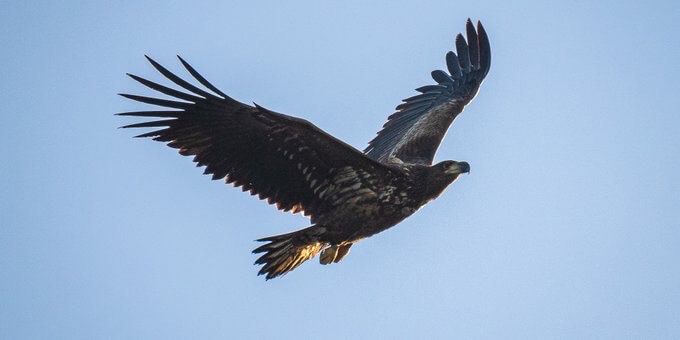The NPA and the NFU have criticised a decision by Natural England to approve the reintroduction of white-tailed eagles on a Norfolk estate.
Following a consultation, the agency has decided to grant a licence to release up to 60 white-tailed eagles over a five-year period on the Ken Hill estate, which is operating an ‘early-stage lowland rewilding project’.
The White-tailed Eagle, or Sea Eagle, is Britain’s largest bird of prey with an 8-foot wingspan – and the farming industry fears the apex predators could pose a threat to livestock, including young pigs, in one of the most pig-dense parts of the country.
“The project aims to restore a population of White-tailed Eagles to West Norfolk and to the surrounding region,” the estate said on its website.
“This will involve the release of young White-tailed Eagles at Wild Ken Hill. The released birds will regard the area as home, and some will settle to breed in the local area once they reach breeding age.”
You can see information about the project HERE
A reintroduction project began in 2019 on the Isle of Wight, while the species has been reintroduced to Scotland and Ireland. There have been reports of the eagles targeting lambs.
The agency told the NPA: “Natural England understand your concerns about impacts on livestock businesses but having examined evidence from elsewhere in Europe we have concluded that the risks are low and are manageable.”
Taking on board farming concerns, the agency has decided that the project should last 10 years rather than the five that was originally intended, extending the time in which the project will be required to work with landowners into the period when it is expected that the eagles will begin breeding.
The licensees have undertaken to assist farmers and other rural businesses to manage concerns and resolve problems.
NPA response
NPA senior policy adviser Charlie Dewhirst said: “We are disappointed that Natural England has given the project the green light without addressing the concerns of NPA members. East Anglia is home to a significant proportion of the UK’s outdoor pig herd and farmers are rightly worried by the potential impact of introducing these large apex predators.
“Despite a number of outstanding concerns, we do welcome the decision to extend the stewardship of the scheme from five to ten years, ensuring that the eagles are monitored once breeding pairs have been established.
“The NPA also welcomes the Ken Hill Estate’s offer to work with us and we will continue to push for further safeguards and guarantees before any birds are released.”
The NFU also criticised the decision. NFU East Anglia environment adviser Rob Wise said:
“The likely range of these birds is home to around half of the country’s outdoor reared pigs and poultry, and also has a significant amount of sheep grazing.
“Farmers are worried that the sea eagles will prey on livestock including lambs, piglets and free-range poultry.
“Many members are also concerned about the impact sea eagles will have on their conservation efforts.”
“We will wait to see the full requirements and conditions Natural England is placing on the licence but we are encouraged by the fact that the licence has been extend from the proposed five years to ten years.
“We welcome Ken Hill’s commitment to work with us, as the project progresses. It is crucial there are adequate measures in place to ensure any impacts on livestock businesses and conservation efforts are managed and dealt with appropriately.”
- Main pic, credit: https://wildkenhill.co.uk




